
We use cookies to enhance your experience on our website, analyze site usage, and support our marketing efforts. By continuing to browse or by clicking “Accept All,” you agree to our use of cookies.
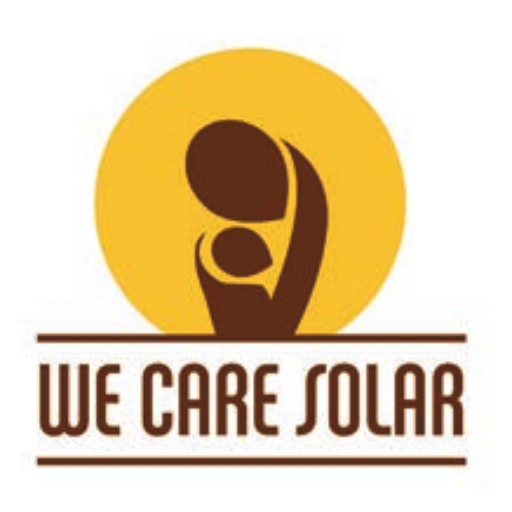
Photo: Beth Eanelli
FROM THE EXECUTIVE DIRECTOR
For an estimated 760 million people who live without electricity, critical services stop when the sun goes down.
A health facility without power means
…caring for patients in near darkness,
…being unable to call for help in emergencies,
…medical equipment lays dormant and C-sections cannot be performed,
…delaying procedures until daytime, and
…mothers and newborns cannot get lifesaving care.
A school without power means
…being unable to read or study at night,
…being unable to use electronic tablets or computers, and
…having no access to the internet.
For more than a decade, we have been changing that. In 2021, we supported hundreds of communities battling COVID-19, expanded our Light Every Birth initiative to Sierra Leone, and inspired thousands of students through our We Share Solar education. We are grateful to all of our donors and partners who make this life-changing work possible and are pleased to share highlights from 2021 with you.
With Gratitude,
Laura Stachel, MD MPH DrPH
Executive Director and Co-Founder
9.7 million mothers and babies served
7,283 Solar Suitcases deployed
to health facilities
49 countries received
Solar Suitcases
77,243 tons of CO2 averted
30,606 health workers trained
732 Solar Suitcase installers trained
36,882 students engaged in solar STEM
893 education Solar Suitcases deployed
439 teachers trained
660 school-based programs
345,947 international youth benefited
225 million hours of clean energy for health and education
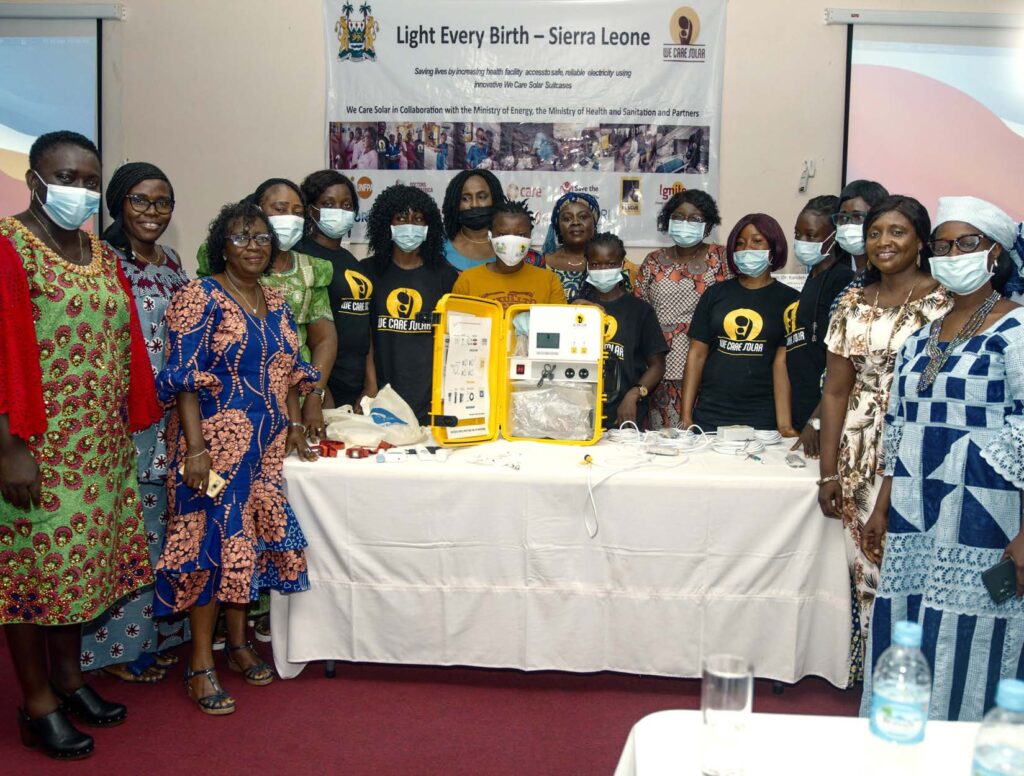
Photo: Nahim Kamara
Light Every Birth is our international initiative to ensure that every woman can access safe childbirth in a well-lit health facility. In December, we officially welcomed Sierra Leone as our fourth Light Every Birth country. The event brought together government officials, key stakeholders, and partners, who celebrated our efforts to date in more than 700 communities and pledged to help us reach every public health facility in need. Esteemed speakers included Dr. Eldred Taylor (Deputy Minister of Energy), Dr. Anthony Augustine Sandi (Deputy Minister of Health and Sanitation), and Dr. Kandeh Yumkella, a Member of Parliament who formerly served as the Under-Secretary-General of the United Nations and CEO of the UN Sustainable Energy for All Initiative. Dr. Yumkella applauded Light Every Birth and called upon governments to embrace renewable energy in order to achieve the Sustainable Development Goals (SDG). “Sustainable energy is the driver of development,” he stressed, adding that “no single SDG can be implemented without reliable energy.”
Our Women’s Empowerment Program is giving women in Sierra Leone the chance to expand cultural norms through a program that addresses the under-representation of women in a traditionally male field: renewable energy. Our 2021 training—conducted by women, for women—was designed to eliminate typical barriers women encounter in STEM* education. Instructors from Remote Energy taught classes on solar electricity, Solar Suitcase installation, and how to properly train health workers to use the Solar Suitcase and its medical accessories. Practical sessions on power tool usage, ladder safety, and rooftop solar panel mounting complemented classroom learning. There was universal pride expressed upon program completion. Graduates stated the program required them to be courageous, driven, and collaborative. “I learned to have focus, self-confidence and to achieve,” one woman told us. “The program makes you strong, fearless, and encourages you to make decisions on your own,” explained another. “I am thankful for the opportunity to do what I love—bringing smiles to the faces of those in need.” During the clinic installations, trainees were seen as role models for community members unaccustomed to seeing women working on rooftops with power tools. After watching one installation with astonishment, one nurse asked if she could join the installation team. Many graduates were eager to show that “whatever a man can do, a woman can do better.” *STEM=Science, Technology, Engineering, and Math
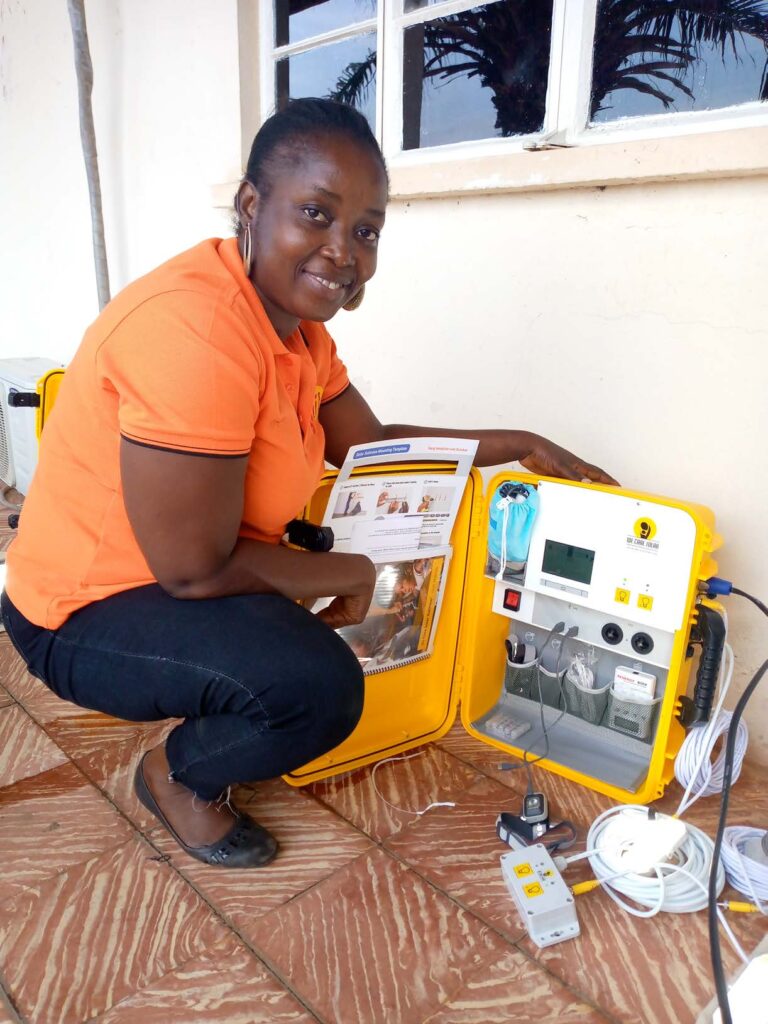
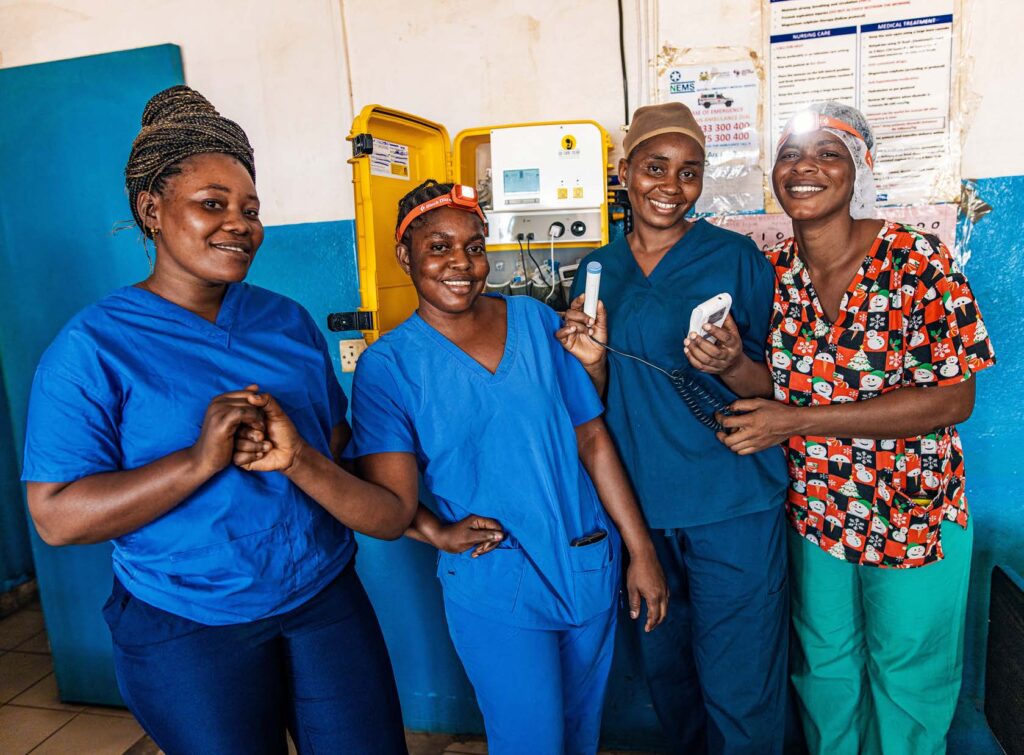
Photo: Envizage Concepts
Light Every Birth Sierra Leone is improving the morale and experience of health workers throughout Sierra Leone. Rose Bangura, maternal child health aide at the Jenner Wright Clinic used to be fearful of nighttime shifts. “You can’t imagine how difficult it was before the Solar Suitcase was installed. When we didn’t have power, we would have to use a torchlight or our cell phones—not recommended in a delivery room when a patient is in labor because of the risk of spreading disease and infection.” At the Hill Station Community Health Center, Deema Coomber was also delivering babies near-darkness at night, a situation that made it especially challenging to offer high quality care during the pandemic.
The Solar Suitcase brought continuous lighting in the delivery room and postnatal ward to both facilities. Deema now can keep her phone charged, making it easier to obtain consultations and make referrals. The Doppler has made the fetal heartrate audible for midwives and mothers, and has led to increased numbers of women coming for prenatal care.
Deema recounted the story of a woman she delivered who had a retained placenta. Under the bright lights of the Solar Suitcase, the source and quantity of bleeding were identified, and Deema could call for an ambulance without delay. Without the Solar Suitcase, Deema doubts that this would have been a success story. Deema offered her thanks on behalf of her team and the patients they serve. “We have less challenges since the Solar Suitcase was gifted to our facility.” Rose agrees, telling us how things have changed since the Solar Suitcase was installed. “The lights are very bright and we don’t need to use our phones and torchlight any more. This has been a great help to us.”
As Uganda responded to an unrelenting pandemic, Solar Suitcases found homes in 178 labor rooms, 46 operating theaters, and 4 neonatal intensive care wards. The healthcare system was periodically overwhelmed with waves of COVID-19 infections and reinstated lockdowns to combat the surges. Solar Suitcase installers faced roadblocks, delays, and intermittent restricted movement.
Initially, some teams faced suspicion from rural health workers. “People knew that we were from Kampala, and many assumed that we could be carrying the virus with us,” explained installer Andrew Engalu. Installers played an educational role, describing what was known about the transmission of COVID-19 and modeling infection control protocols.
As the pandemic spread, most people knew someone who had COVID-19. “Midwives became afraid of every patient that they encountered because of the higher infection rate,” Andrew continued. “They were so worried about delivering mothers in darkness who had COVID-19. When they see we are bringing a solution that provides light, they breathe a sigh of relief.”
Andrew is now called weekly by midwives, thanking him for the Solar Suitcases and the increased safety afforded by bright lights, infrared thermometers, reusable face masks, and the fetal Doppler. Andrew appreciates the opportunity to be making a difference. “Now that we are bringing medical devices, I feel like I’m helping the health sector and the country as opposed to just being a technician.”
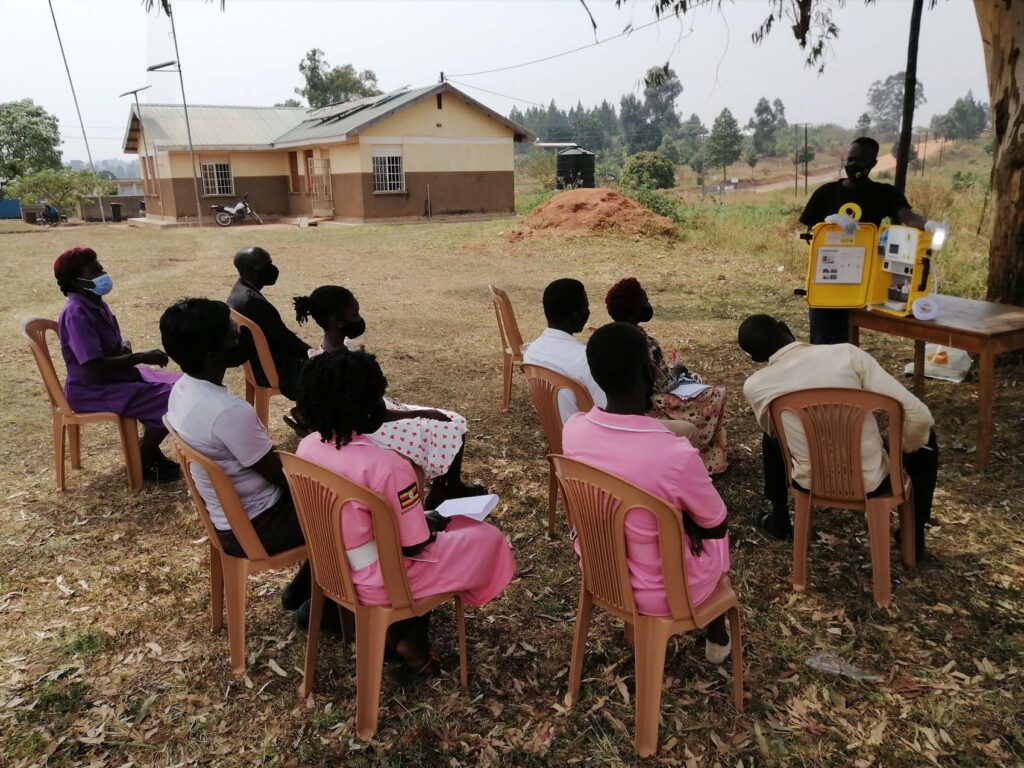
Photo: Christopher Alitema, Feni & Team
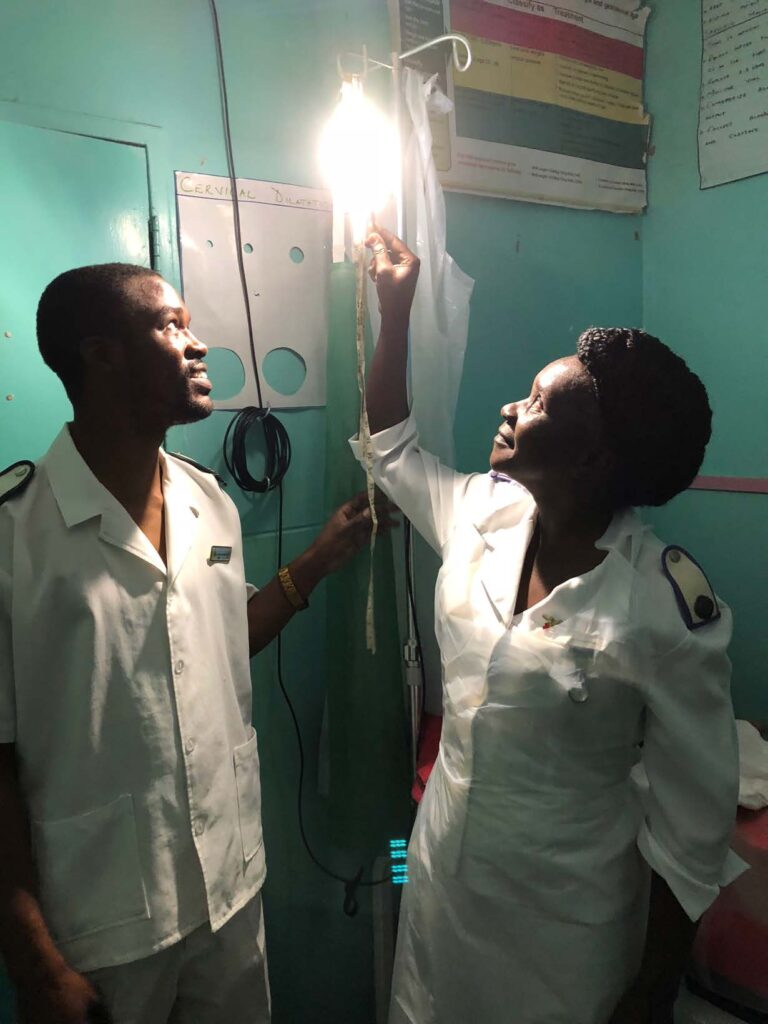
Photo: Laura Stachel
This year, 340 Solar Suitcases were installed in health facilities, enhancing safe childbirth services for 85,000 mothers and newborns each year. With our clean energy program, midwives are relieved to no longer rely on candles, lanterns, or cell phones for late night care.
Lighting is needed for normal deliveries and is essential for addressing obstetric emergencies, preparing medications, inserting intravenous lines, and performing critical procedures.
“We need light to do our work!” explained one midwife. “We used to use our phones during deliveries or when attending to emergencies. Usually, I would be alone, and there would be no one to hold the phone. It would be very difficult because I would not be able to make sure that the light was pointing at the mother’s perineum after delivery to check for bleeding.”
Hemorrhage is one of the most dangerous complications in obstetrics. “A mother had already delivered and was bleeding profusely. When a patient hemorrhages, we place a Non-pneumatic Anti-Shock Garment (NASG) under her legs and over the abdomen to reduce blood flow to the uterus and treat hypovolemic shock while allowing us to repair where the bleeding occurred. We need light to do this work.”
Through our Light Every Birth initiative, more than 1,000 facilities in Zimbabwe now have reliable lights and power to provide timely care, use lifesaving equipment, and attend to obstetric and neonatal complications.
Liberia was our first Light Every Birth country. After reaching our goal by equipping hundreds of public health facilities in 2019, we worked closely with the government to plan for program sustainability.
In April, the Family Health Division of the Ministry of Health and Social Welfare in Liberia brought together multiple stakeholders to map out the long-term sustainability of Light Every Birth Liberia. This important meeting paved the way for the smooth implementation of the Sustainability Plan, including Solar Suitcase maintenance by government technicians.
Bentoe Tehoungue, Director of Family Health, has been a strong advocate of We Care Solar programs for years. “The Solar Suitcase is an essential part of our maternal-child health program. We are pleased to have Solar Suitcases in hundreds of primary health centers throughout the country. By working together to build robust supply chains and servicing protocols, we will ensure that this program will function well for years to come.”
We Care Solar organized government technician trainings in all 15 counties of Liberia. Federal and local technicians had an in-depth training on Solar Suitcase equipment and plans were put in place for future battery replacement. Together with the government and our partners, we are working to keep the lights shining in Liberia.
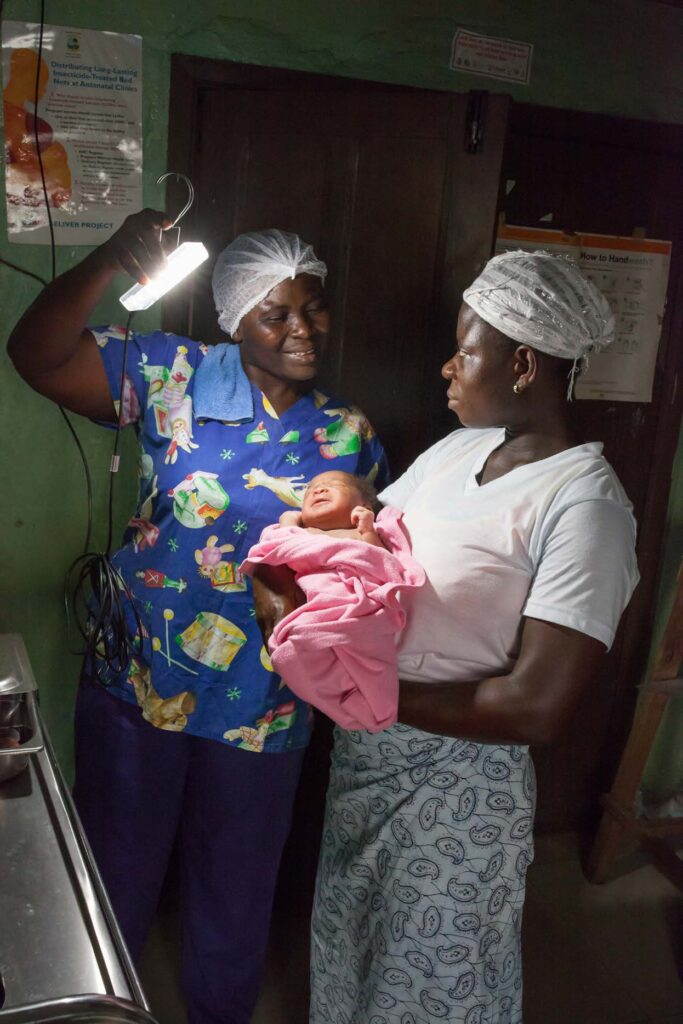
Photo: Liz Hale
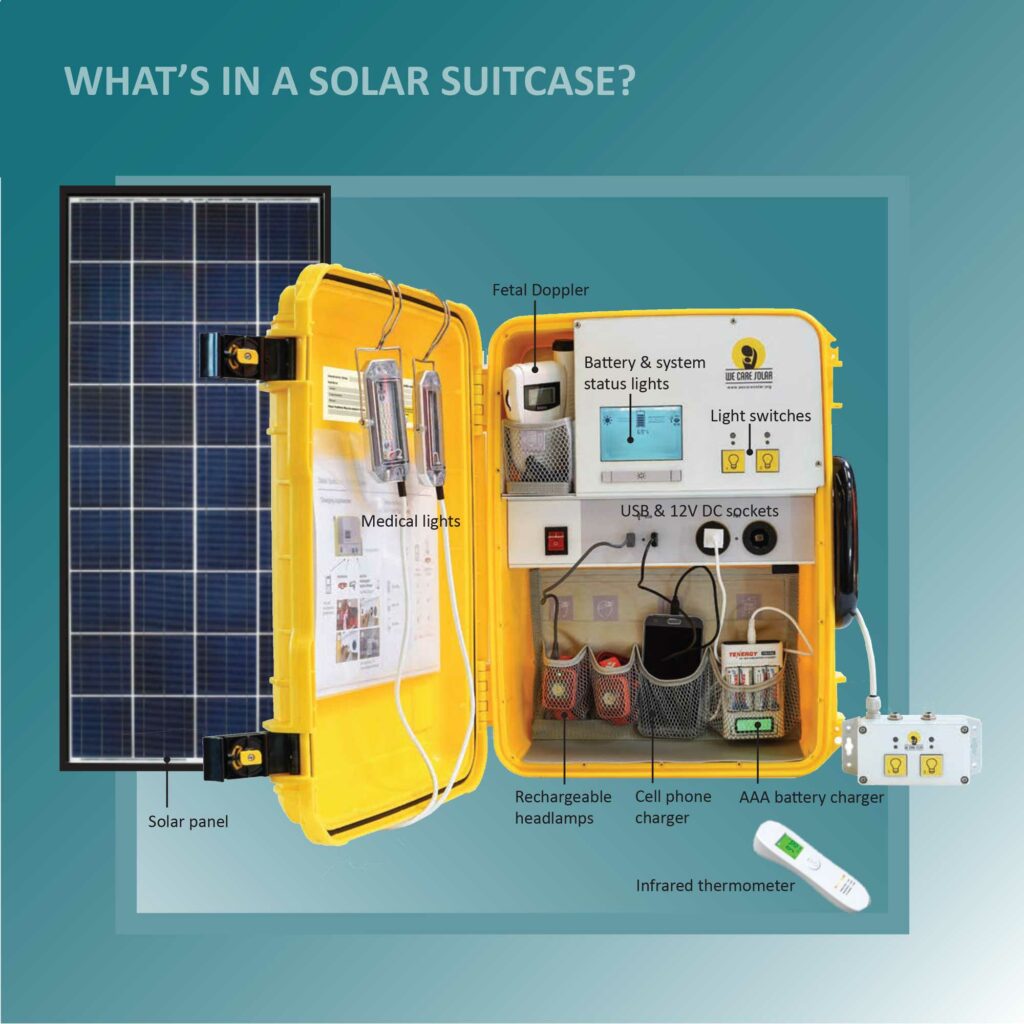
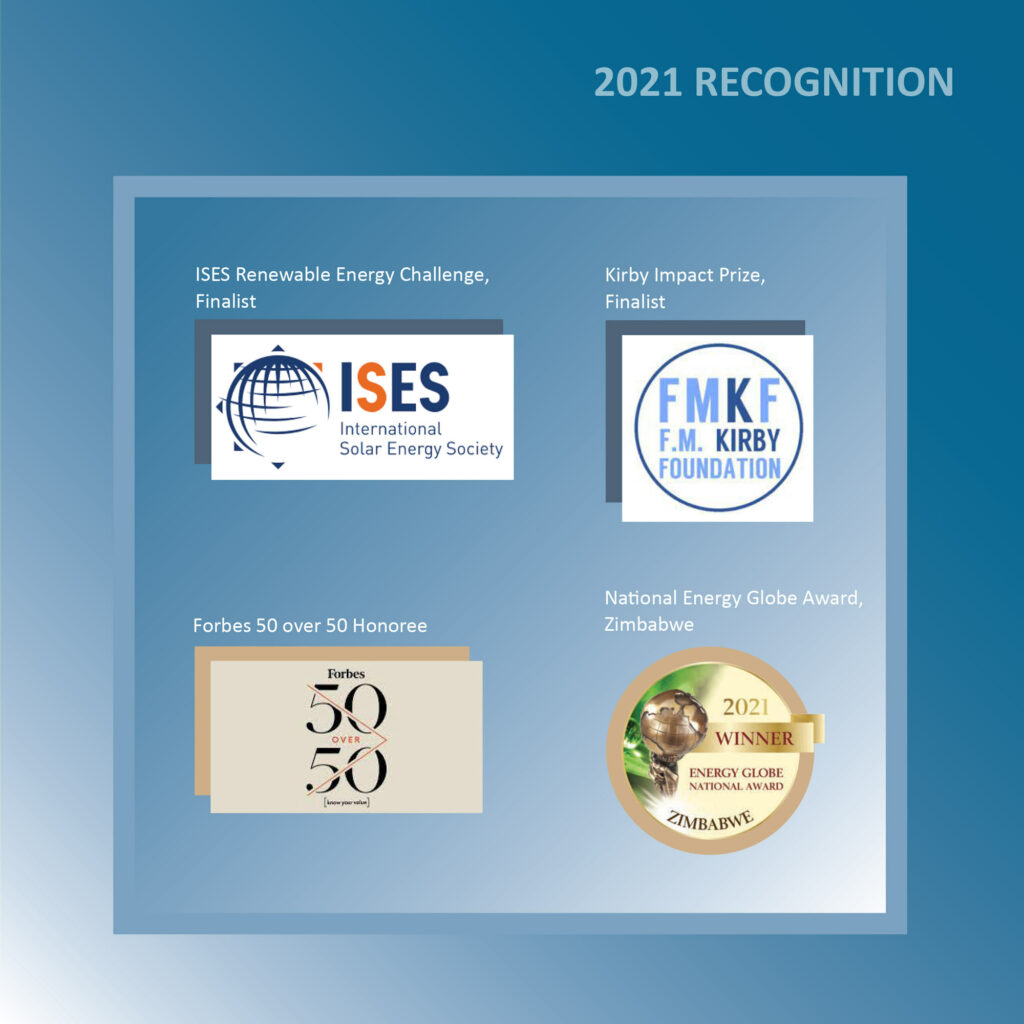
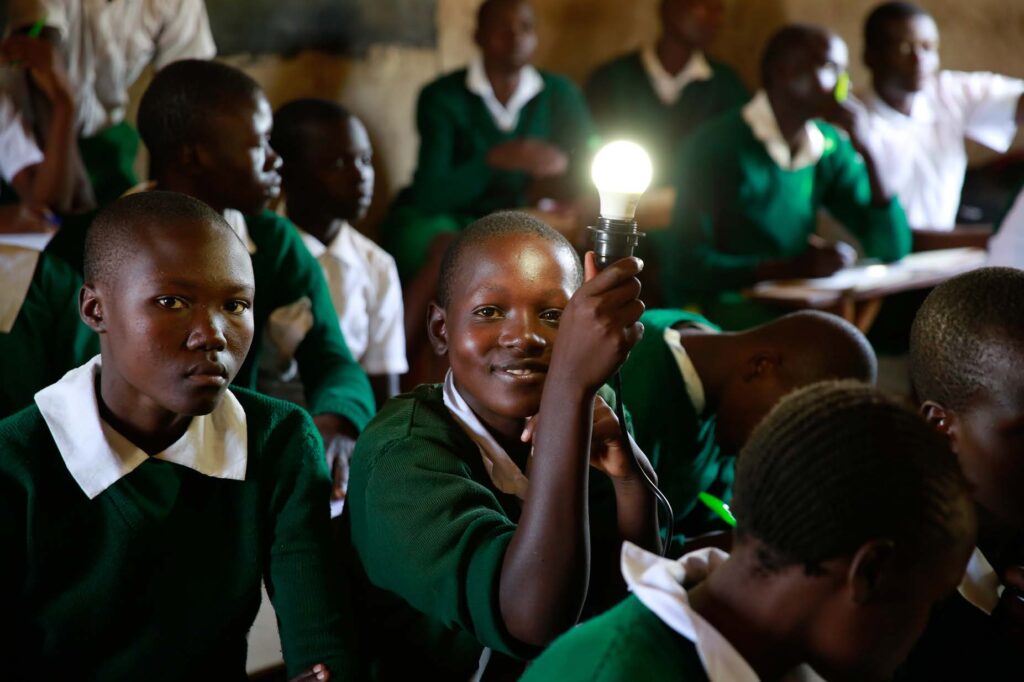
Photo: Brian Inganga
We Share Solar engages students in project-based solar energy education with real-world impact. Since 2013, we have successfully implemented our STEM* education programs in American and international schools, with a curriculum that combines practical engineering, solar energy, scientific innovation, and humanitarian service. Students learn about energy poverty, climate change, innovation, career opportunities, and the role of renewable energy in addressing global challenges.
As classrooms reopened in 2021, We Share Solar returned to in-person learning. Our trainings reached teachers across 93 schools in the United States, enabling 7,666 students to engage with our hands-on curriculum. Our international deployments brought light and power to schools, community centers, and refugee camps in energy-deficient communities, serving 31,600 youth.
In addition to launching a self-paced, independent learning platform called Power2Share, We Share Solar also added new educational programs in California, Florida, Kenya, and New Zealand, offering youth around the world the opportunity to “Learn, Build, and Share” the power of solar to change the world.
*STEM=Science, Technology, Engineering, and Math
Power2Share is our new independent STEM learning program for students and teachers. The program is 100% online, asynchronous and independent. It’s ideal for teacher trainings, small groups, individual capstone projects, and corporate team building. The new curriculum utilizes the successful “Learn, Build, and Share” model of our traditional educational program and enables We Share Solar to reach new communities.
LEARN – Self-paced and Interactive Curriculum: We Share Solar’s comprehensive online curriculum inspires and educates students through project-based learning and interactive materials. Custom-designed lessons are available to participants on a user-friendly virtual platform called Thinkific and address climate change, solar science and innovation, and global energy access.
BUILD – Solar Equipment: Learners explore the fundamentals of solar electricity— balancing load, storage, and solar panels—through hands-on learning as they build a Solar Suitcase. In our engaging instructional videos, we highlight key program elements and provide examples of engineering best practices.
SHARE – Solar Suitcase Deployment: Once built, the Solar Suitcase is returned to We Share Solar for quality certification and shipped to East Africa where it is installed at an energy-deficient rural or refugee community school. High-impact placement stories and photos are shared so participants can see their work in action.
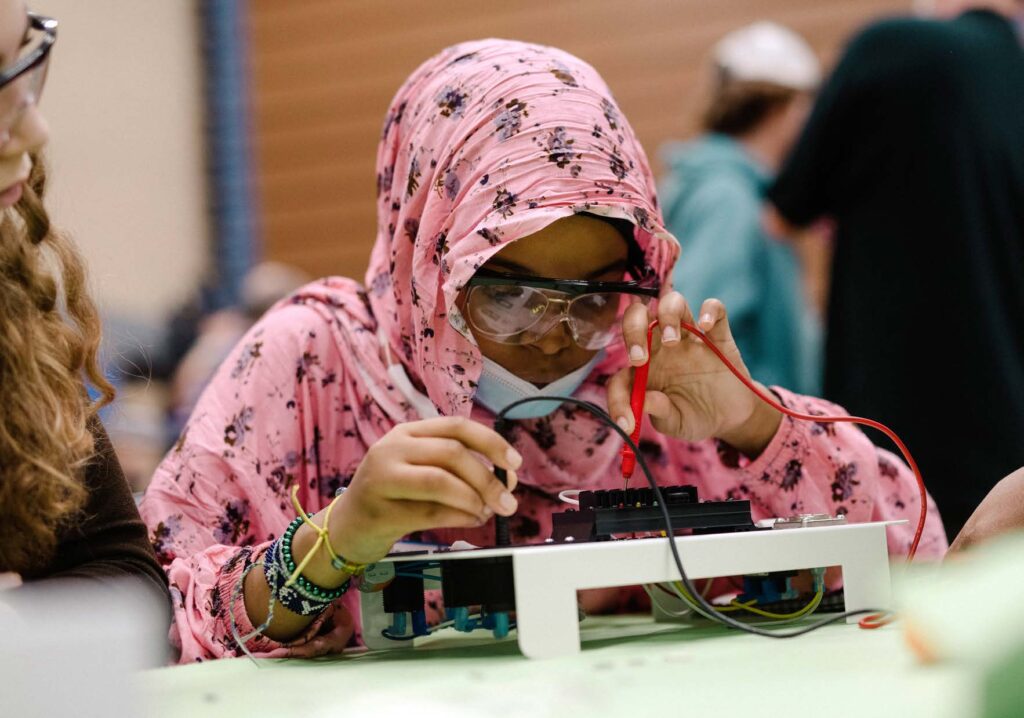
Photo: Stephen Maturen
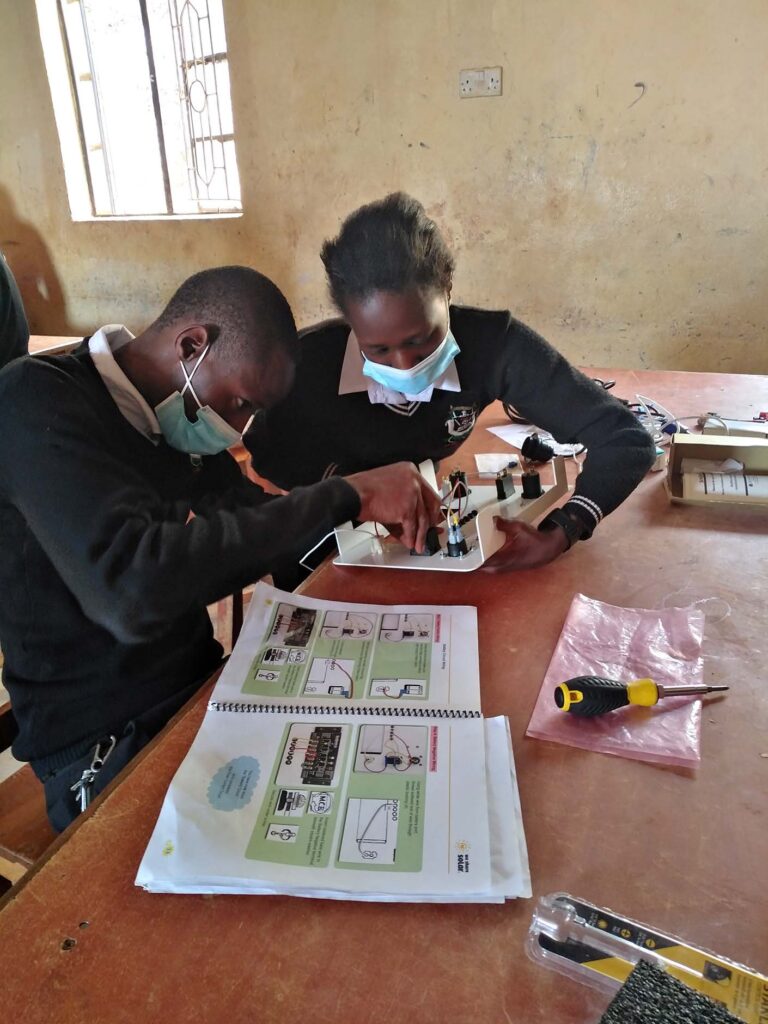
Photo: Jacinta Gatwiri
To provide STEM education in the midst of school closures, We Share Solar and Women in Sustainable Energy and Entrepreneurship (WISEe) led a series of one-day solar workshops in Kenya. Students were excited to have a chance to build Solar Suitcases and learn about solar electricity. These workshops were so well received—with some students opting to skip breaks to continue with the lessons—that we now include this hands-on student education experience when we conduct solar installations in schools. Through these workshops, students gain a deeper understanding of the standalone solar electric system installed in their respective communities and can learn about future career options. This model was implemented with great success at 6 sites in Makueni and Machakos counties reaching an average of 20 students at each site.
Students in the Rwamwanja Refugee Settlement got the gift of light this year through a new pilot program launched in partnership with Alight International. The settlement is located in the Kamwenge District of Western Uganda where the vast majority of the refugees are women and children from the Democratic Republic of the Congo (DRC). Electricity in the settlement is a challenge; only 1 in 7 households have access to renewable energy. Phones are used to connect to the internet and residents must travel to a nearby town to charge their devices. Phone charging costs more than 25% of the daily per capita income.
Access to energy and education are essential for lifting communities out of poverty. With sites selected by our partners at Alight International, each of the Solar Suitcases installed in Rwamwanja Refugee Settlement can light three school rooms. Annually, each suitcase provides 410 students with 11,210 hours of solar light for improved education, expanded study hours, and power to charge communication devices that support remote learning.
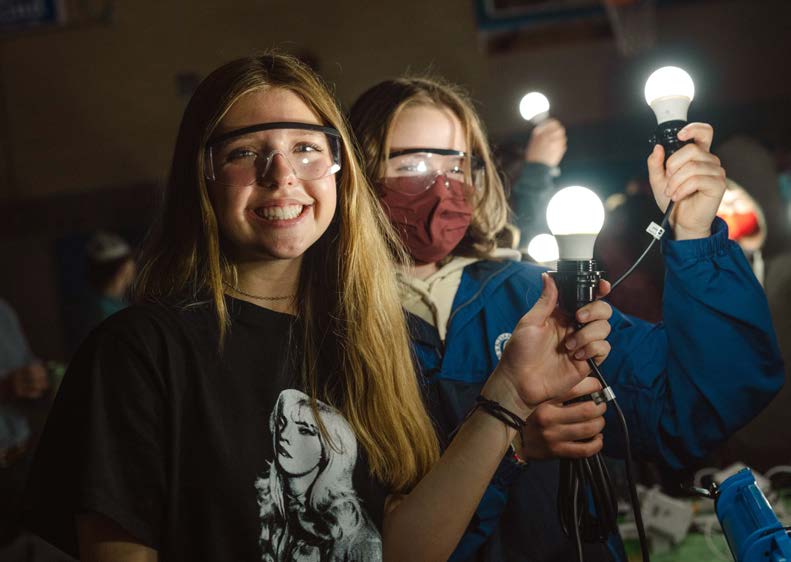
Photo: Stephen Maturen
We Share Solar began the 2021 school year in Florida, leading a special workshop for six middle schools in partnership with Sarasota County Schools. After 18 months of online instruction, we were excited to be working in person again. Sarasota teachers expressed their excitement to bring global service learning to students as they engaged in hands-on lessons that augmented our STEM curriculum with art projects. In California, we introduced our project-based curriculum within the Los Angeles Unified School District, conducting teacher workshops for 12 schools.
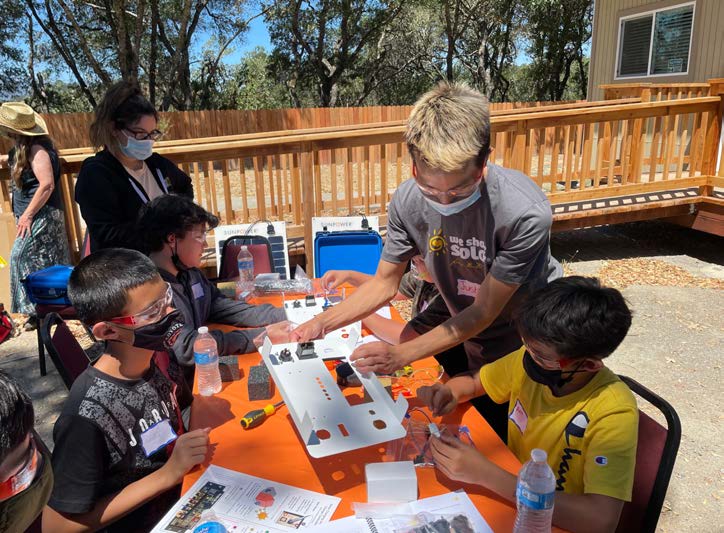
Photo: Hal Aronson
Youth from the Yurok Tribe Boys and Girls Club in California enjoyed our summer workshop under the sun. Our team was joined by our partners at Trees, Water & People to lead an exciting one-day event supported by the Wells Fargo Foundation. Student activities included building Solar Suitcases and powering solar water fountains.
A few weeks later, as part of our PG&E Solar Suitcase Program, the We Share Solar team led a teacher training and project-based youth workshop with four Northern California tribes.
The Hopland Band of Pomo Indians hosted this interdisciplinary event that provided hands-on solar lessons, including designing and powering water fountains and solar-powered art projects. Native education leaders learned to build Solar Suitcases and teach our emergency preparedness curriculum.
Both programs enhanced renewable energy education and emergency resilience in Native communities and resulted in student-built Solar Suitcases for use in tribal lands.
We Share Solar increased opportunities for students around the globe with the launch of a pilot program in Aotearoa New Zealand in partnership with Kia Kotahi Ako Trust. Maori, Samoan, and Tongan youth had an opportunity to become solar “Solutionaries” through a program at the Haeata Community Campus in Aranui, Christchurch. The curriculum featured lessons on climate change and solar electricity. Students built Solar Suitcases that they could adapt for different scenarios. Their final project was to create a proposal using solar power to solve an issue of personal importance.
In addition to working in teams to solve problems and gaining an appreciation for solar electricity, teachers reported that their students became more interested in climate change concerns. Louise Halahan, an educator working for Kia Kotahi Ako Trust, was excited to be “developing future solar engineers and solar workers.”
Fleur West, a teacher at the school, was thrilled to bring this hands-on educational program to her students. “It’s such an incredible program. I’ve been teaching for 20 years and I don’t think I’ve ever seen such a high level of student engagement. We’re so lucky to have been able to bring this [program] here. I’m so grateful.”
The real-world relevance of the course heightened student awareness of climate change and the value of solar energy. After questioning why their school didn’t have solar power, these new “Solutionaries” encouraged their own school to install solar panels. It was challenging to draft a formal proposal for the school board, but as one student commented, “I feel like that’s a part of the struggles of adult life. You’re going to have to work so hard to get stuff done like installing solar panels.”
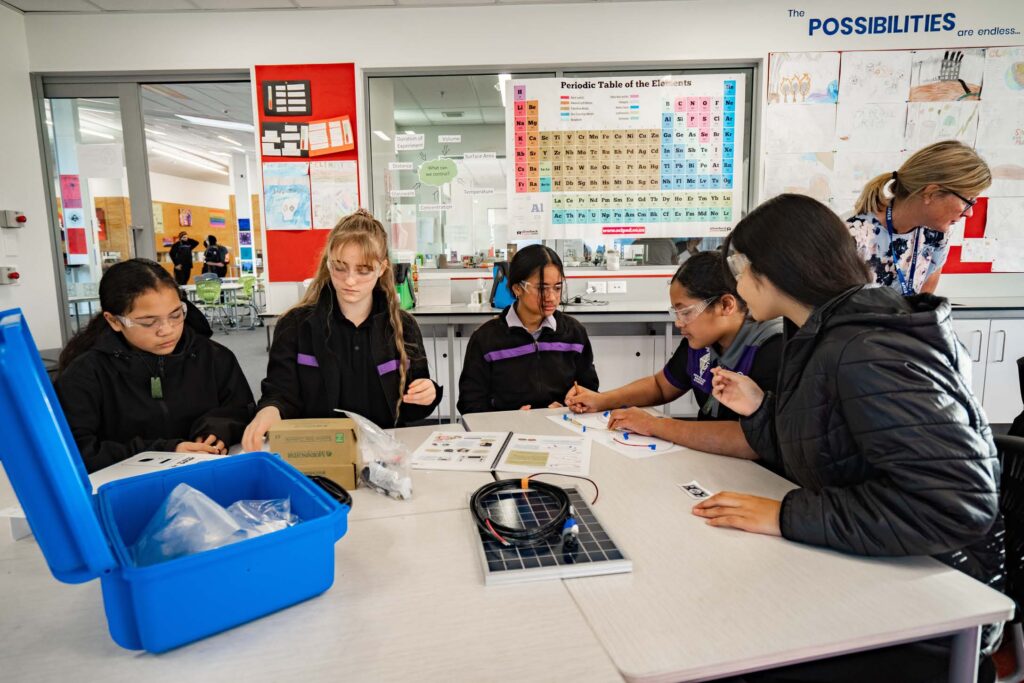
Photo: Richie Mills/Kia Kotahi Ako Trust
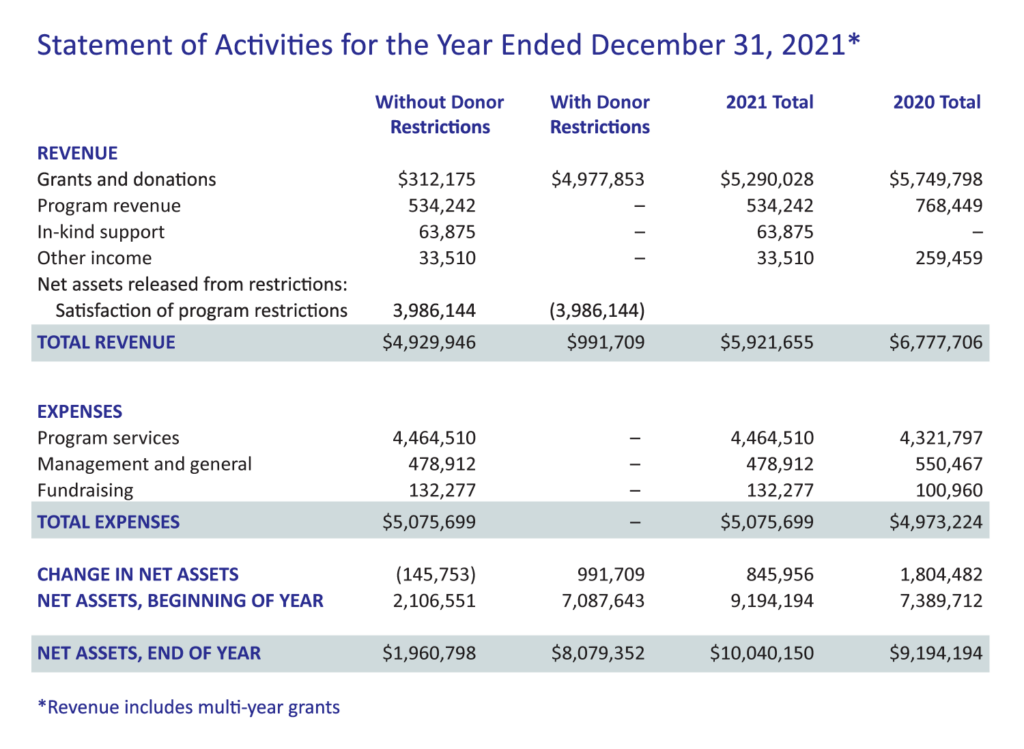
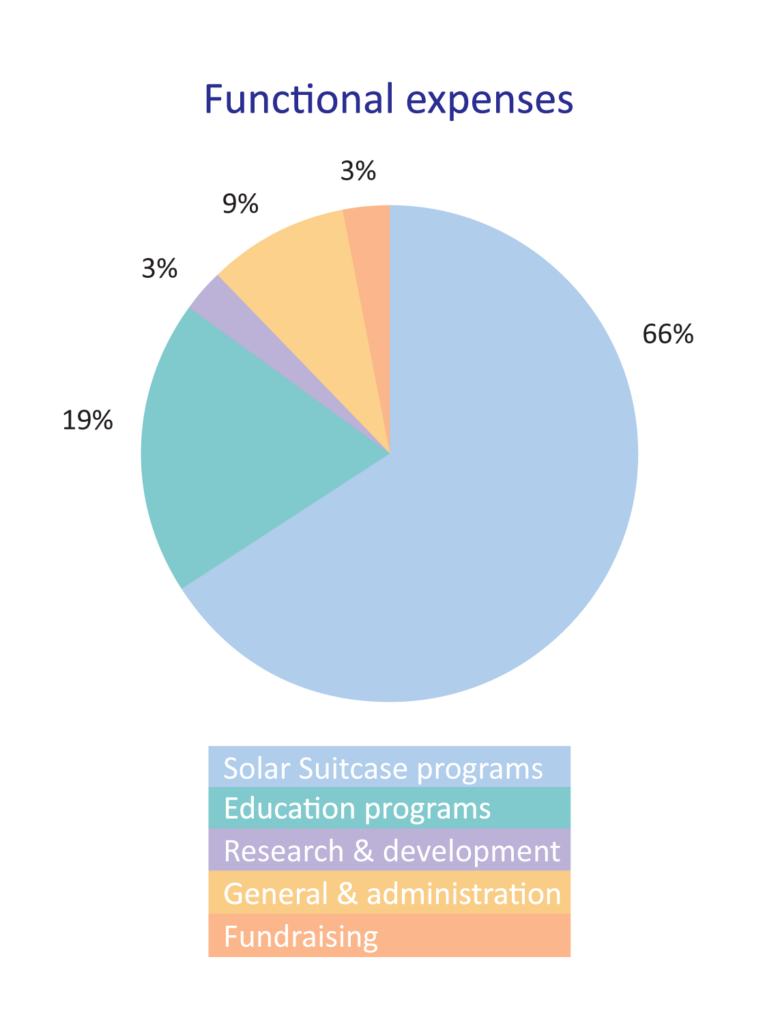
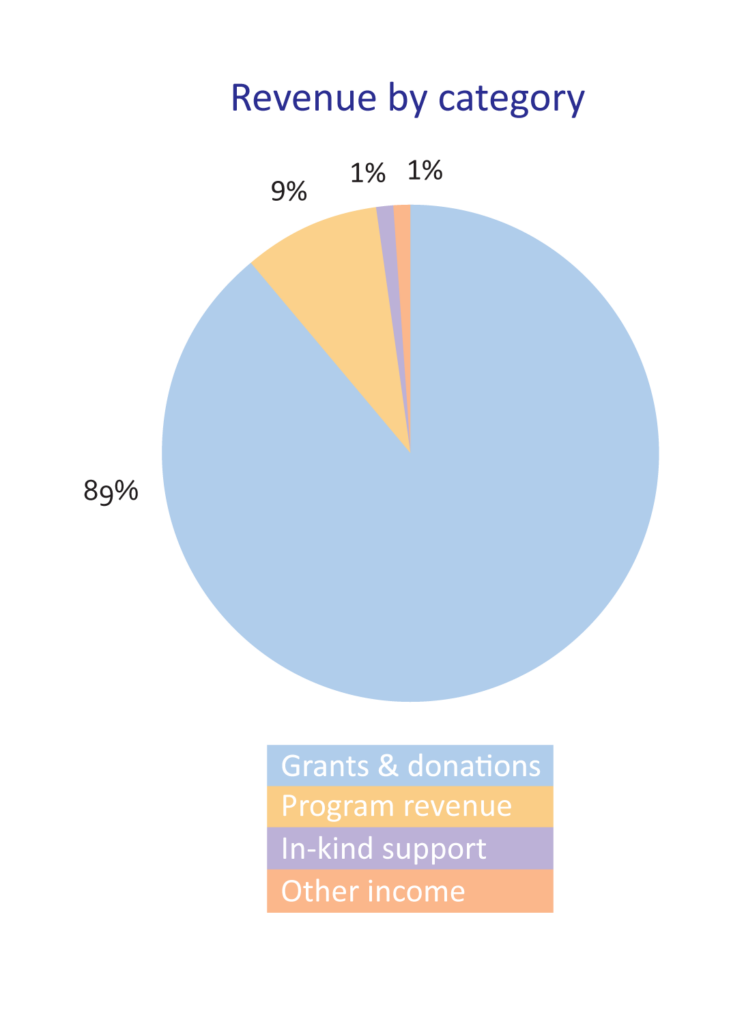
We Care Solar Partners
AEL General Trading (Eritrea)
All in Trade Ltd. (Uganda)
AVSI Foundation (Uganda)
Brick by Brick (Uganda)
CARE (Sierra Leone)
Clinton Health Access Initiative (Uganda)
Doctors with Africa CUAMM (Sierra Leone, Uganda, Ethiopia) Ekide Investments Ltd. (Uganda)
Engineering World (Zimbabwe)
Feni Certified Installation Team (Uganda)
GOAL (Sierra Leone)
Health Child Uganda (Uganda)
Horizon Energy (Sierra Leone)
Ignite Solar (Sierra Leone)
International Rescue Committee (Sierra Leone)
IntraHealth International (Uganda)
Little Sun Foundation (Ethiopia)
PWRDF/EHALE (Mozambique)
Save the Children (Sierra Leone)
Smart Energy (Liberia)
UN Women (Liberia)
UNFPA (Sierra Leone)
Women in Renewable Energy (Liberia)
ZimEnergy EcoFoundation (Zimbabwe)
Government Partners
Ministry of Energy, Sierra Leone
Ministry of Health and Child Care, Republic of Zimbabwe Ministry of Health and Sanitation, Sierra Leone
Ministry of Health and Social Welfare, Republic of Liberia Ministry of Health, Republic of Uganda
United States
Boys & Girls Club of the Yurok Tribe Cahto Tribe of the Laytonville Rancheria California State University
Charlotte-Mecklenburg Schools Coyote Valley Band of Pomo Indians Creation Technologies
Kashia Band of Pomo Indians
Los Angeles Unified School District Minndependent
Minneapolis Public Schools
Native Sun
Remote Energy
Sarasota County Schools
Trees, Water & People
Global
254 Solar (Kenya)
ALIGHT International (Uganda)
Brick by Brick (Uganda)
Kabale University (Uganda)
Kakenya School for Excellence (Kenya) Kia Kotahi Ako Trust (New Zealand) Resilience Action International (Kenya)
WISEe – Women in Sustainable Energy and Entrepreneurship (Kenya)
WISER International (Kenya)
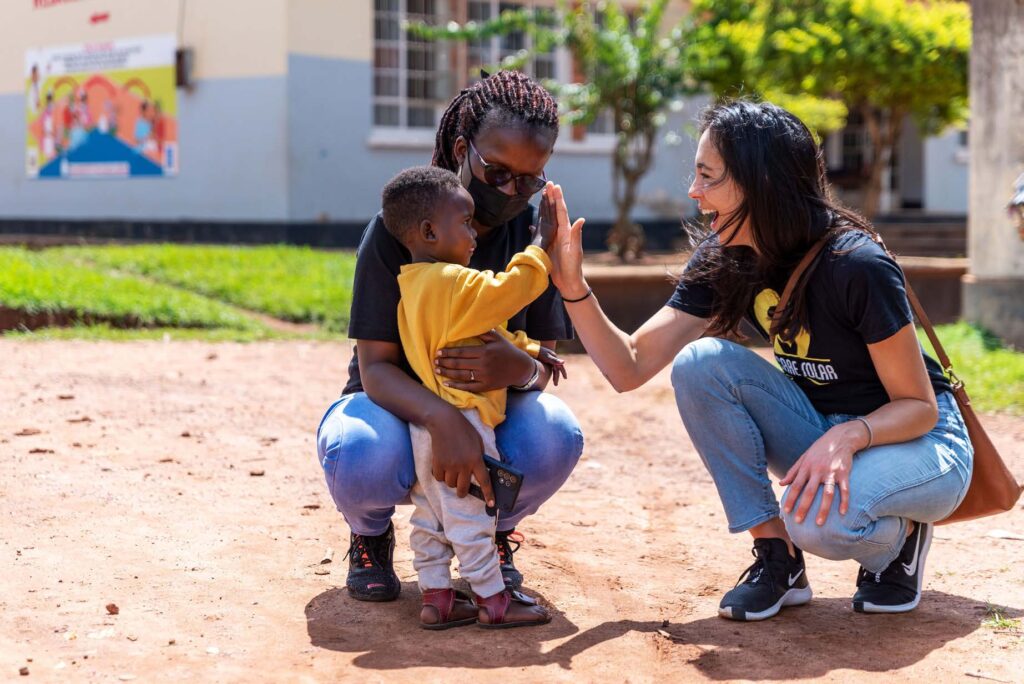
Photo: Giovanni Okot
We are grateful for the generous support of all our donors, including the following donors who have sponsored a clinic or contributed $5,000 or more.
Principal Benefactors
AEL General Trading
Andrew and Bonnie Weiss
Anonymous Foundation
CRI Foundation
Daniel E. Offutt III Charitable Trust
Frank McHugh-O’Donovan Foundation Marks Family Foundation
Meadow Fund
Pacific Gas and Electric Company
Primate’s World Relief & Development Fund
UBS Optimus Foundation
Wells Fargo Foundation
WEM Foundation
Lead Funders
Dhilan Parikh Shah Fund
Edison International
Frank H. & Eva Buck Teacher Grant Program Little Sun Foundation
Mary Anne (M.A.) Rogers
Montei Foundation
Philanthropic Ventures Foundation
Rotary Club of Mount Pleasant District 7305
Segal Family Foundation
SunPower Foundation
UN Women Liberia
Wells Fargo Bank
Key Supporters
Ascienzo Family Foundation
Asiff Hirji and Sarah Wigglesworth
Cheryl Finley and Barry Neal
Dekko Family Fund of the Minneapolis Foundation
Edgewater Foundation
James and Sharon Maida Foundation
Jim and Gigi Goldman Family Fund
Osprey Foundation
PIVOT Madagascar
Richardson Family Fund
Subbarao and Lakshmi Chalavadi
Champions
Anna & Zac Koons-Steinkirke Family Foundation
Callahan Dee Family Foundation
Liz and Tom Murley Charitable Fund
Nick & Cynthia Mindicino in memory of Chester Bennington
Paragon Energy Advisors
Ruth Shaber, MD
South Berwick-Eliot Rotary Club District 7780
Volt Energy, LLC
Clinic Sponsors
Gail Kendall
George Tibbits in honor of Amber Robbin
Jeff Fry and Michele Brown
John and Ashby Pinkard
Lauri Hughes
Nikki Van Kalker
Williams Family Fund
Photo: Laura Stachel
Photo: Giovanni Okot
Annual Report Design by WinterGraphics, Berkeley, CA

We use cookies to enhance your experience on our website, analyze site usage, and support our marketing efforts. By continuing to browse or by clicking “Accept All,” you agree to our use of cookies.